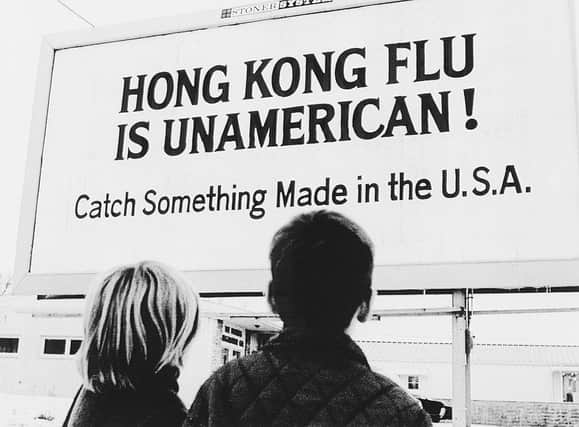How does 1968 compare to 2020? Similarities and differences between two of history’s most tumultuous years explained


Regarded as one of the most traumatic years in recent world history, 1968 brought about ground-shaking social and political change, and many are now suggesting the events of 2020 could bring about similar levels of transformation to life in the US and beyond.
In Europe, protests and revolutions gripped much of the Eastern Bloc, while divisive rhetoric driven by the likes of Enoch Powell sowed division in the UK.
Advertisement
Hide AdAdvertisement
Hide AdThe evolution of media coverage meant much of the world became horrified onlookers as events like the Biafran famine and the Vietnam War unfolded in front of their eyes.
What happened in 1968?
January 5: Alexander Dubcek sees off the Stalinist Antonin Novotny in the race to become first secretary of Czechoslovakia, marking a period of liberalisation known as The Prague Spring. This period of freedom would be brief with Soviet forces rolling into the country in August and reinstating hardline Communist rule.
January 30: The North Vietnamese and Vietcong launch an attack on the Vietnamese lunar new year (Tet) known as the Tet offensive inflicting mass casualties on the US and South Vietnamse forces. This would be a vital turning point in America’s involvement in the war.
March 16: Robert Kennedy announces he is running in the US election. On the same day American forces slaughter 500 civilians in the Southern Vietnamese village of My Lai.
April 4: Martin Luther King is assassinated after giving a speech in Memphis in which he said: “I’ve seen the Promised Land. I may not get there with you. But I want you to know tonight that we, as a people, will get to the Promised Land.” News of his murder sparked protests across the US.
April 20: Enoch Powell delivers his infamous Rivers of Blood speech in which he aggressively criticises mass immigration. The speech results in Powell’s removal from Edward Heath’s shadow cabinet.
April 23: students at Columbia University in New York City protest the Vietnam War with police beating and arresting hundreds of supporters.
May 6: Protests grip much of the world from Mexico City to Paris. On May 6 hundreds of protestors are injured in Paris following clashes between protestors and police. This would lead to the dissolving of the French national assembly.
Advertisement
Hide AdAdvertisement
Hide AdJune 5: Robert F. Kennedy is assassinated on the eve of his prime victory in California. He was assassinated by Jordanian immigrant Sirhan Sirhan who said he felt betrayed by the Senator’s support of Israel during the Six Day War.
July 13: first recorded cases of the Hong Kong Flu which claimed the lives of between 1 and 4 million globally.
August 26-29: bloody protests grip Chicago during the Democratic Party convention with Yippies, Students for a Democratic Society (SDS) and the Black Panthers among those protesting.
October 6: athletes Tommie Smith and John Carlos raise their fists in solidarity with the Black Power movement during the US National Anthem at the Mexico City Olympic games.
November 5: Richard Nixon wins the US election, the Republican candidate championing the “silent majority” who had voted him in. During his campaign Nixon outlined himself as the “law and order” candidate, pledging to reestablish control across the country’s revolting cities.
December 24: Apollo 8 orbits the moon – the latest US victory in the space race.
What are the similarities to 2020?
Several similarities can be drawn between 1968 and 2020.
The spread of a deadly flu also caused widespread fear in 1968. First recorded in July the H3N2 flu spread across the globe claiming the lives of between 1 and 4 million. The flu would not arrive in the UK until 1969, striking in two waves and killing between 30,000 and 40,000 on each occasion. The coronavirus pandemic has so far killed 44,000 in the UK.
The Black Lives Matter protests which have gripped the US following the death of George Floyd echo the civil rights protests of 1968.
Advertisement
Hide AdAdvertisement
Hide AdThe symbolic raising of a fist in the fashion of Tommie Smith and John Carlos has also been widespread with sports stars from the UK, the US and beyond showing solidarity with the Black Lives Matter movement by taking a knee or raising a fist.
The race to the White House has striking similarities for instance, with President Trump and his supporters frequently drawing on the rhetoric of Richard Nixon. Mr Trump has referred to himself as the "law and order” candidate and insisted that he will be elected into the White House for a second term by “a silent majority”.
Mr Nixon called on the “silent majority” of mainly older Americans opposed to demonstrations to vote for him during the 1968 election.
As in 2020, the presidential election in 1968 took place amid urban unrest, rising violent crime, racial tension, clashes between protesters and the police, and a high degree of political polarization.
Whether Trump can defy odds like Richard Nixon and emerge from the 2020 US Election as president remains to be seen.